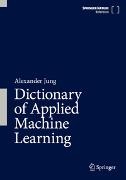Share
Fr. 452.00
Alexander Jung
Dictionary of Applied Machine Learning
English · Hardback
Shipping usually within 6 to 7 weeks
Description
In an era where machine learning (ML) reshapes industries faster than terminology can standardize, The Dictionary of Applied Machine Learning emerges as an indispensable compass for navigating this dynamic discipline.
This rigorously curated reference offers not just definitions but contextual clarity at the intersection of ML theory and practice.
Why This Book Stands Apart
- Bridging Silos: Uniquely designed to connect academic research, industrial applications, and interdisciplinary domains, this dictionary deciphers jargon while highlighting how concepts like federated learning, model robustness, and explainable AI translate into real-world impact.
- Depth Meets Accessibility: From basic tools like linear algebra and calculus to advanced areas like fairness and cybersecurity, the dictionary explains concepts clearly and accurately-easy to follow for beginners, and helpful for experienced readers too.
- Evidence-Based Insights: Drawing from 100+ supervised master's theses, it grounds abstract methodologies in applied case studies, revealing how optimization techniques (e.g., adaptive gradient descent) tackle challenges in healthcare, finance, and beyond.
Who Is This Book For?
- Researchers & Teachers: Use clear definitions and shared ideas to work better across different fields.
- Industry Professionals: Make faster, more intelligent choices with short and clear explanations of topics like reinforcement learning and reducing bias.
- Students & Learners: Get a well-organized guide to ML without jumping between confusing sources.
Why This Book Helps
- Stay Up to Date: Learn about essential ML topics that are often skipped, like making models more reliable and fair.
- Save Time: Quickly understand the difference between ML types or how deep learning has changed.
- Use What You Learn: The Dictionary explains key ideas and how to apply them through common algorithmic patterns.
Prerequisites: You don't need advanced math-just some comfort with high-school-level math. The book's clear structure makes it useful for both beginners and experienced readers.
As ML's influence expands, so does the risk of miscommunication across fields. The Dictionary of Machine Learning resolves this clarity crisis-equipping readers to speak the language of innovation fluently. Whether you're designing algorithms, deploying models, or shaping policy, this is the reference that grows alongside your career.
List of contents
Main Tools for Machine Learning.- Main Components of ML.- Main Flavours of ML.- Optimization for ML.- Robustness in ML.- Deep Learning.- Fairness in ML.- Real-world applications.
About the author
Alexander Jung, is a tenured Associate Professor in Machine Learning at Aalto University, Finland. He earned his Dipl.-Ing. (MSc) and Dr.techn. (PhD) degrees in electrical engineering and signal processing from TU Vienna in 2008 and 2012, respectively. Currently, he is leading the Machine Learning for Big Data group at the Department of Computer Science at Aalto University. With over 15 years of experience in research and education, he is passionate about advancing the field of machine learning and mentoring the next generation of AI and data science experts. He has been selected as the Computer Science Teacher of the Year in 2018 and supervised already more than 100 master thesis projects in applied machine learning.
Summary
In an era where machine learning (ML) reshapes industries faster than terminology can standardize, The Dictionary of Applied Machine Learning emerges as an indispensable compass for navigating this dynamic discipline.
This rigorously curated reference offers not just definitions but contextual clarity at the intersection of ML theory and practice.
Why This Book Stands Apart
• Bridging Silos: Uniquely designed to connect academic research, industrial applications, and interdisciplinary domains, this dictionary deciphers jargon while highlighting how concepts like federated learning, model robustness, and explainable AI translate into real-world impact.
• Depth Meets Accessibility: From basic tools like linear algebra and calculus to advanced areas like fairness and cybersecurity, the dictionary explains concepts clearly and accurately—easy to follow for beginners, and helpful for experienced readers too.
• Evidence-Based Insights: Drawing from 100+ supervised master’s theses, it grounds abstract methodologies in applied case studies, revealing how optimization techniques (e.g., adaptive gradient descent) tackle challenges in healthcare, finance, and beyond.
Who Is This Book For?
• Researchers & Teachers: Use clear definitions and shared ideas to work better across different fields.
• Industry Professionals: Make faster, more intelligent choices with short and clear explanations of topics like reinforcement learning and reducing bias.
• Students & Learners: Get a well-organized guide to ML without jumping between confusing sources.
Why This Book Helps
• Stay Up to Date: Learn about essential ML topics that are often skipped, like making models more reliable and fair.
• Save Time: Quickly understand the difference between ML types or how deep learning has changed.
• Use What You Learn: The Dictionary explains key ideas and how to apply them through common algorithmic patterns.
Prerequisites: You don’t need advanced math—just some comfort with high-school-level math. The book’s clear structure makes it useful for both beginners and experienced readers.
As ML’s influence expands, so does the risk of miscommunication across fields. The Dictionary of Machine Learning resolves this clarity crisis—equipping readers to speak the language of innovation fluently. Whether you’re designing algorithms, deploying models, or shaping policy, this is the reference that grows alongside your career.
Product details
| Authors | Alexander Jung |
| Publisher | Springer, Berlin |
| Languages | English |
| Product format | Hardback |
| Released | 11.10.2029 |
| EAN | 9789819532070 |
| ISBN | 978-981-9532-07-0 |
| No. of pages | 970 |
| Illustrations | XXX, 970 p. |
| Subjects |
Natural sciences, medicine, IT, technology
> IT, data processing
> IT
Künstliche Intelligenz, machine learning, Artificial Intelligence, Deep Learning Techniques, Model Optimization, ML Terminology, Interpretable Machine Learning, Applied Machine Learning, Data and Model Understanding, ML Theory and Practice, AI and ML Concepts |
Customer reviews
No reviews have been written for this item yet. Write the first review and be helpful to other users when they decide on a purchase.
Write a review
Thumbs up or thumbs down? Write your own review.

